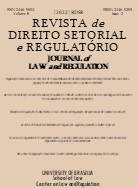Challenges on regulating Big Techs – and how Responsive Regulation can help
Keywords:
Regulation. Big Techs. Technology. Challenges. Responsive Regulation.Abstract
Abstract
[Purpose] To analyze the basis of Responsive Regulation Theory concerning regulatory powers to impose sanctions, and its application in technology markets (known as Big Techs).
[Methodology/approach/design] Theoretical analysis and analysis of Facebook Platform as a practical example.
[Findings] Resposive Regulation, specially concerning its punishment system, is the most suitable for Big Techs.
[Practical implications] It is a well-known fact that regulation of Big Techs is a recent issue, especially considering technology development, which had impressive evolution over the last few decades. Therefore, conclusions in this work may contribute on such debate.
References
ADAMS, T. Facebook’s week of shame: the Cambridge Analytica fallout. The Guardian, Londres, Marrço 2018. Disponivel em: <https://www.theguardian.com/technology/2018/mar/24/facebook-week-of-shame-data-breach-observer-revelations-zuckerberg-silence>.
ARANHA, M. I.; LOPES, O. D. A. Estudo sobre Teorias Jurídicas da Regução Apoiadas em Incentivos. UNB/ANATEL. Brasília. 2019.
AUSTRALIAN National University - Profiles. Australian National University, 2022. Disponivel em: <https://researchprofiles.anu.edu.au/en/persons/john-braithwaite>. Acesso em: 08 maio 2022.
AYRES, I.; BRAITHWAITE, J. Responsive Regulation - Transcending the Deregulation Debate. Nova Iorque: Oxford University Press, 1992. Acesso em: 08 maio 2022.
BAHADUR, N. What It's Like When Your Rapist Appears Under Facebook's 'People You May Know'. Huffpost, 20 abril 2015. Disponivel em: <https://www.huffpost.com/entry/kevin-kantor-people-you-may-know_n_7100968>. Acesso em: 26 abr. 2022.
BRAITHWAITE, J. John Braithwaite. UBC Law Review, Vancouver, 44, n. 3, 2011. 475-520. Disponivel em: <http://johnbraithwaite.com/wp-content/uploads/2016/03/essence_responsive_regulation.pdf>. Acesso em: 08 maio 2022.
CADWALLADR, C.; GRAHAM-HARRISON, E. How Cambridge Analytica turned Facebook ‘likes’ into a lucrative political tool. The Guardian, Londres, Março 2018. Disponivel em: <https://www.theguardian.com/technology/2018/mar/17/facebook-cambridge-analytica-kogan-data-algorithm?CMP=soc_568>. Acesso em: 06 maio 2022.
CADWALLADR, C.; GRAHAM-HARRISON, E.; TOWNSEND, M. Revealed: Brexit insider claims Vote Leave team may have breached spending limits. The Guardian, Londres, Março 2018. Disponivel em: <https://www.theguardian.com/politics/2018/mar/24/brexit-whistleblower-cambridge-analytica-beleave-vote-leave-shahmir-sanni>. Acesso em: 06 maio 2022.
CANAL TECHCRUNCH. Mark Pincus On Zynga Revenue. Youtube, 6 novembro 2009. Disponivel em: <https://www.youtube.com/watch?v=S7YaVVpK1G4>. Acesso em: 29 abr. 2022.
DAVIES, H. Ted Cruz using firm that harvested data on millions of unwitting Facebook users. The Guardian, Londres, dezembro 2015. Disponivel em: <https://www.theguardian.com/us-news/2015/dec/11/senator-ted-cruz-president-campaign-facebook-user-data>. Acesso em: 06 maio 2022.
FEDERAL TRADE COMISSION (FTC). Complaint in the Matter of FACEBOOK, INC., a corporation. United States Federal Trade Comission. Estados Unidos. 2011. (0923184).
HILL, K. Facebook recommended that this psychiatrist's patients friend each other. Splinter, 2016. Disponivel em: <https://splinternews.com/facebook-recommended-that-this-psychiatrists-patients-f-1793861472>. Acesso em: 26 abr. 2022.
HILL, K. How Facebook Outs Sex Workers. Gizmodo, 2017. Disponivel em: <https://gizmodo.com/how-facebook-outs-sex-workers-1818861596>. Acesso em: 26 abr. 2022.
HILL, K. 'People You May Know:' A Controversial Facebook Feature's 10-Year History. GIZMODO, 2018. Disponivel em: <https://gizmodo.com/people-you-may-know-a-controversial-facebook-features-1827981959>. Acesso em: 27 abr. 2022.
LEVY, S. Facebook: The Inside Story. Nova Iorque: Dutton, v. 1, 2020.
LOPES, O. D. A. Fundamentos da Regulação. Rio de Janeiro: Editora Processo, 2018.
META. Meta, 2007. Disponivel em: <https://about.fb.com/news/2007/05/facebook-unveils-platform-for-developers-of-social-applications/>. Acesso em: 06 maio 2022.
NEATE, R. Facebook faces biggest legal battle in years as US officials launch lawsuits. The Guardian, Londres, Dezembro 2020. Disponivel em: <https://www.theguardian.com/technology/2020/dec/10/facebook-faces-biggest-legal-battle-in-years-as-us-officials-launch-lawsuits>.
PIERSON, D. Facebook needed third-party apps to grow. Now it’s left with a privacy crisis. Los Angeles Times, Los Angeles, Março 2018. Disponivel em: <https://www.latimes.com/business/technology/la-fi-tn-facebook-third-parties-20180320-story.html>. Acesso em: 06 maio 2022.
STIEGLER, G. The Theory of Economic Regulation. The Bell Journal of Economics and Management Science, 2, n. 1, 1971. 3-21. Disponivel em: <http://www.jstor.org/stable/3003160>.
TAMBINI, D.; MOORE, M. Regulating Big Tech. 1. ed. Nova Iorque: Oxford University Press, 2022.
VICTOR, D. FarmVille Once Took Over Facebook. Now Everything Is FarmVille. The New York Times, Nova Iorque, Janeiro 2021. Disponivel em: <https://www.nytimes.com/2020/12/31/technology/farmville-zynga-facebook.html>. Acesso em: 06 maio 2022.
WILLSON, M.; LEAVER, T. Zynga’s FarmVille, social games, and the ethics of big data mining. Communication Research and Practice, Austrália, 1, Junho 2015. 147-158. Disponivel em: <https://www.tandfonline.com/toc/rcrp20/1/2?nav=tocList>. Acesso em: 29 abr. 2022.
YALE Law School - Our Faculty - Ian Ayres. Yale Law School, 2022. Disponivel em: <https://law.yale.edu/ian-ayres>. Acesso em: 08 maio 2022.
ZUCKERBERG, M. Is Connectivity a Human Right? Meta, 21 Agosto 2013. Disponivel em: <https://about.fb.com/news/2013/08/mark-zuckerberg-is-connectivity-a-human-right/>. Acesso em: 07 maio 2022.
Downloads
Published
Issue
Section
License
Copyright (c) 2022 Journal of Law and Regulation

This work is licensed under a Creative Commons Attribution 4.0 International License.
By submitting this paper to the Journal of Law and Regulation, I hereby declare that I agree to the terms of the Creative Commons Attribution 4.0 International (CC BY 4.0), available at http://creativecommons.org/licenses/by/4.0.


